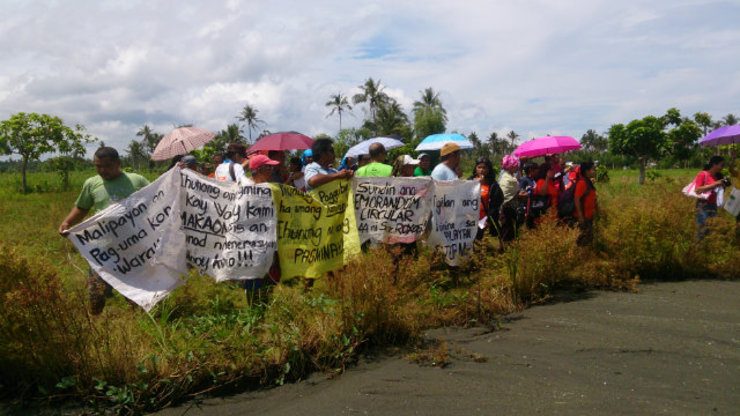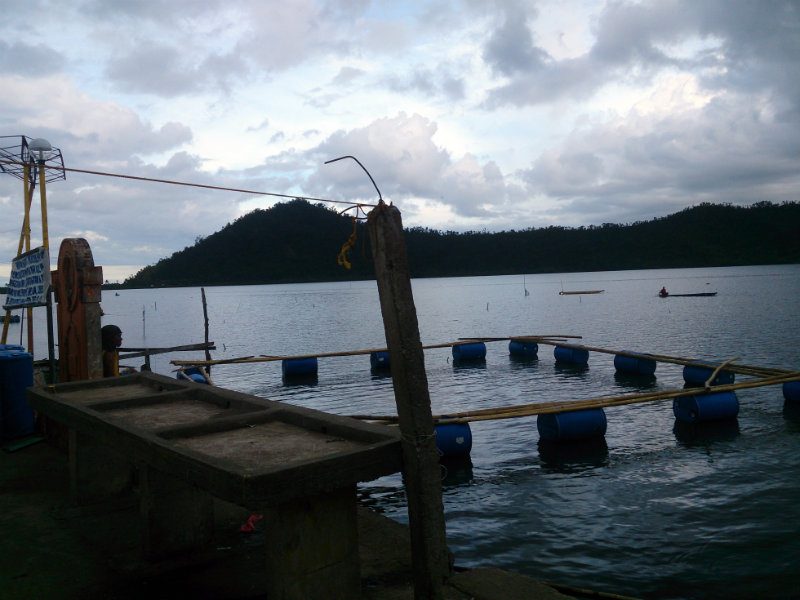SUMMARY
This is AI generated summarization, which may have errors. For context, always refer to the full article.

I recently spent a week in eastern Visayas, the region where typhoon Yolanda first passed through almost 10 months ago.
I represented our civil society network in the general assembly of Alyansa Tigil Mina (ATM, or Alliance Against Mining) on August 18-21 at the Visayas State University in Baybay City, Leyte Province, and I was happy to reunite with participants from mining-affected communities and other civil society groups from across the country.
On the last day of the assembly, we visited the Pacific-facing town of MacArthur, named after the American general. It is classified as a 5th class municipality, part of the second poorest group of towns in the country. Almost 22,000 of its residents were affected by the typhoon, including more than a hundred farmers and fisherfolk who made up the people’s organization UNLAD, short for Unahin Natin Lagi Ang Diyos (“Always put God first”).
ATM reported back in late November that “houses, schools, churches, [and] markets were all damaged.” Their partners, including UNLAD, added that about 80% of the town’s coconut trees were destroyed. But despite being badly hit by Yolanda themselves, UNLAD members connected ATM with devastated barangays (villages) and supported the network’s relief operations in several towns in Leyte.

The house of UNLAD’s secretary general Bernardita Morcilla, 67, looked like most others in the area: the roof was comprised mostly of gleaming new galvanized steel sheets and a couple of tarpaulins. It stands at the entrance to UNLAD’s communal organic farm, which aims to provide food and income for its members and other residents. The farm project started during ATM’s early recovery phase and continues well into the rehabilitation and reconstruction phase, which includes cash-for-work programs, livelihood, and some shelter and infrastructure support for three towns.
Fishkill
UNLAD was formed by fisherfolk in Bito Lake who blamed the massive fishkill in March 2012 on the Nicua Mining Corporation, which was operating nearby and was releasing mining wastes into the lake. A study by the national fisheries bureau showed that the death of about 22 tons of tilapia was caused by domestic waste, overstocking, and contamination from the site of the Chinese firm. Tita Brenie said the lake turned brown – “like 3-in-1 coffee” – and that she had to stop selling the fish she harvested in her fish pen for a time because the fish tasted like oil and grease.
The townspeople formed a barricade at the end of April and reached out to the government and the media with the support of ATM and its partners. Nicua was suspended in August 2012 for various reasons, but other firms have since arrived in MacArthur to mine magnetite in its farmlands. Tita Brenie said more than 70 hectares of the town’s farmlands have now been destroyed, and the rest are drying out because the company has diverted the irrigation.
Magnetite sand is highly-sought after for steel production. The black sands of many beaches, most notably in the Northern Luzon regions, have been scooped up in the quest for the valuable mineral, leaving coastal areas and river banks eroded and more vulnerable to sea level rise, floods, and storm surges.

‘Food, not sand’
We were touring the vegetable farm and sampling the organic produce for lunch when Tita Brenie and an ATM officer asked if we can extend the solidarity visit to the farm to a mobilization in the black sand mining site of RT Mining Corporation in the ricefields of Barangay Maya. We readily agreed to join them.
UNLAD members led the mobilization, holding up cheesecloth and rice sacks with messages in the local language such as, “Farming is better without mining!” and “Uphold the Memorandum Circular No. 44 of Sec (Mar) Roxas!” The latter referred to the Interior Secretary’s order for all local governments to suspend or cancel all illegal small-scale mining operations, especially black sand mining in coastal areas. We also chanted “Tao Muna, Hindi Mina! (People First, Not Mining!)” and “Pagkain, Hindi Buhangin! (Food, Not Sand!).”
You would think that the people of MacArthur and other Yolanda and mining-affected communities have enough to worry about, but going against mining is part and parcel of increasing their resilience not only to disasters but also to the impacts of climate change.
While scientists have yet to directly link extreme weather events with climate change, we do know that climate change has stacked the odds against vulnerable countries like the Philippines, with global warming fueling typhoons like Yolanda and contributing to sea level rise.
In the international climate negotiations, the Philippines has been calling for developed or industrialized countries, which have contributed the most to the climate crisis, to fulfill their commitments to mitigate their greenhouse gas emissions. They also have a responsibility to help developing countries like ours, which contributed the least emissions but already bear most of the consequences, to adapt to climate change impacts by contributing funds and technology.
But we must also challenge our own government to practice at the home front what it preaches across the globe.
It can start by better integrating disaster risk reduction and climate change adaptation in its plans and programs, reforming its mining and land use policy, and shifting to renewable energy. As the nation awaits the next typhoon with dread, with Yolanda survivors still struggling to rebuild their lives and livelihoods, we cannot afford to do anything less. – Rappler.com
Denise M. Fontanilla is the advocacy officer of Aksyon Klima Pilipinas, an advocacy network of civil society organizations working on climate change issues in the international and national fronts. Alyansa Tigil Mina is one of its members.
Add a comment
How does this make you feel?





There are no comments yet. Add your comment to start the conversation.